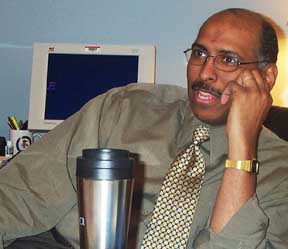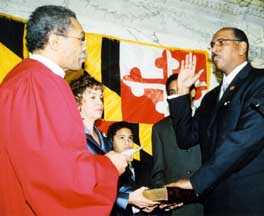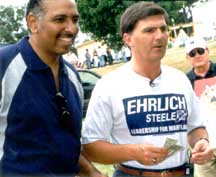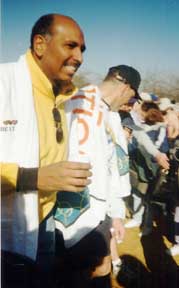|
Bay Weekly Interview: with Sandra Martin & Sara Kajs Lieutenant Governor Michael Steele ‘Any time you have an opportunity to make history, you don’t blink.’
BW Before we talk politics, let’s talk gambling. Should we bet on your former brother-in-law, boxer ‘Iron’ Mike Tyson, to beat Clifford Etienne in that heavyweight fight Saturday night? Is he going to win? MS I have no idea. It depends on his frame of mind at the moment. Boxing is as much mental as it is physical; probably more so. You psyche yourself out or get psyched out by your opponent. Physical prowess means nothing if you don’t have the wherewithal to go into the ring and deal with your opponent mentally. Editor’s note: It took Tyson only 49 seconds to win his February 22 fight. BW What you say about boxing sounds like it applies to the campaign trail. Did you find you had to have the right mental attitude and be physically fit to campaign? MS I actually gained weight during the campaign. Bob lost weight. You do have to be physically prepared to do the running around, but you also have to be mentally prepared because your opponents will take the least little thing and blow it into something huge. Nine times out of 10 it’s nothing, but if it sticks you have to be prepared to deal with it. The other nine times, you have to let it roll off your back. MS He and I have been friends since his early days in Congress and through the political operations of the party. We got closer because of what happened in 1998. When Ellen Sauerbrey lost the race, he became the heir apparent. At the moment that race was concluded, all eyes turned to him. From my perspective, I was still county chairman and wanted to get involved at the state level, take a leadership role and work with the next team.
MS About 10 minutes after the results came in. BW Did you do some of the grooming, so that was part of your relationship? MS Absolutely. As the governor will tell you, I was one of a handful of people who encouraged and cajoled and pushed him to run. I thought it was his time. The party needed a message of youth, opportunism and possibilities yet to come, a very forward-looking vision beyond what we’d been used to. BW What complement of strengths did he see in you? MS I think he saw someone who first and foremost was a friend. I think that was important to him. Remember, congressmen and women are very singular individuals, very individualistic. But now it wasn’t just him for the office. He needed a running mate, someone to complement him in terms of temperament, ideology and focus. He didn’t want a yes-man. BW When you speak of opportunity as one of the messages the Republican party wanted to convey, in a very particular way your election as the first African American to hold statewide office sends a message of opportunity … MS Any time you have an opportunity to make history, you don’t blink. You take it. BW Do you plan on becoming Maryland’s first African American governor in 2010? MS That moment may come again in eight years. And again, the question will have to be asked, ‘Is Maryland ready?’ And history will either say, ‘I can make it’ — or it will be up to us to make it. BW What message does your election send about our state and nation’s progress toward racial equity? MS We have a lot of work to do. The steps on which I was inaugurated — 150 years ago we were selling slaves there. It’s a testament to progress but also a challenge as to what lies ahead. As much progress as we’ve made, African Americans have still not assumed their rightful role and relationship in the partnership with America. African Americans built America. African Americans fought and died for this country: Since the first shot was fired in 1776 to current conflicts, we are there on the front lines providing service and leadership to the country. BW It must have been a thrill … MS Maybe it’s all that seminary training I had, but I take things in differently. I get caught up in excitement, but I temper myself very quickly. I enjoy it, but I don’t enjoy it too much, because I know that there’s a lot of real work that has to be done, and a lot of eyes are watching me. BW So there’s still a double standard … MS I have to jump higher, run faster, think quicker than most lieutenant governors have had to do by virtue of me being the first African American. The standard is different; it just is. BW The president’s stimulus package calls for tax cuts with 50 percent of the benefits going to the richest one percent of Americans, and three-quarters going to the richest five percent in the first year. Do you think that would be healthy for black Americans?
It amuses me that somehow people think that a wealthy black man wants to give all his money to federal and state government. For what? This brother’s out there working, he’s got his career, he’s being paid good money to do a good job. So why should he want any more of his dollars to go to the federal government than anyone else? I’m about creating black wealth. I want to see more black millionaires. The governor and I — if we haven’t created, or begun the process of creating, more black millionaires here in Maryland, then we haven’t done our job of providing full opportunity to all Marylanders. So the president says he wants to create a stimulus package that will reach the top one percent. Guess what? There are some black folk in that top one percent. We should be very happy about that, because whatever they do, their money creates jobs and opportunities for others. There’s nothing wrong with that, particularly in an economy that’s right now stagnant. As long as you’re not hurting the poor, as long as you continue to provide resources to those who really need it in our community, then stimulus incentives are okay by me. BW You’re settling nicely into your new office here in the capital. How are you settling into your new job? MS It’s very, very busy, especially during the legislative session. The governor and I have a lot of people who want to see us, and we’re out and about quite a bit. It’s interesting that people want to meet and see and hear myself and the governor. People are genuinely excited about the opportunity Ehrlich-Steele represents. They genuinely want us to get a fair shake from the legislature and the various groups out there that would line up and throw stones immediately. I think we’re doing well so far. We’re keeping busy meeting constituents, working with legislators on very important legislation that will help us get the stimulus we need for our economy. BW Are slot machines the big item in that stimulus package? MS Slots is a very passionate subject for a lot of people. But the reality is those are dollars currently leaving Maryland to the tune of some $400 million to $500 million a year — not including hotel and restaurant taxes that we lose because [slot players] are not eating and staying in Maryland. Delaware is able to meet their fiscal requirements because they’ve got Maryland tax dollars. We want those dollars here. BW Beyond building relationships and looking at how you’re going to raise revenues, what else has the governor put on your plate? MS I’ve got a number of issues in my portfolio: economic development, because that’s my background as a financial lawyer, especially with regard to our minority business community as well as the international component to open up doors for Maryland. Education, particularly with respect to our historically black colleges and universities, charter schools and certainly K-12. Domestic violence … and the death penalty review. BW You’ve taken the lead in reviewing the death penalty in Maryland. But in terms of the kind of partnership you’re forging with Gov. Ehrlich, was it a problem that your call for the study on the death penalty took him by surprise? MS It’s a partnership. He’s surprised me before in the middle of a press conference. That’s the nature of our relationship. I don’t have to check in with the governor before I say something. He knows I’m an intelligent man who knows the ramifications of what I say and do. I’m not stupid. BW And you’re doing that … MS I’m doing that. In the meantime, as these death-penalty cases bubble up from the appeals courts and come to the governor’s desk, they’ll come to me for review. I’ll make my recommendation to the governor, and he’ll decide.
MS I’m a Bay lover. I can’t swim a lick, but I love being in the Bay on a boat or at least up to my knees. |
© COPYRIGHT 2003 by New Bay Enterprises, Inc. All rights reserved.
Last updated February 27, 2003 @ 2:13am

 Michael Steele has no peer. Never before has an African American been Maryland’s lieutenant governor — nor, for that matter, been elected to any statewide office.
Michael Steele has no peer. Never before has an African American been Maryland’s lieutenant governor — nor, for that matter, been elected to any statewide office. 

